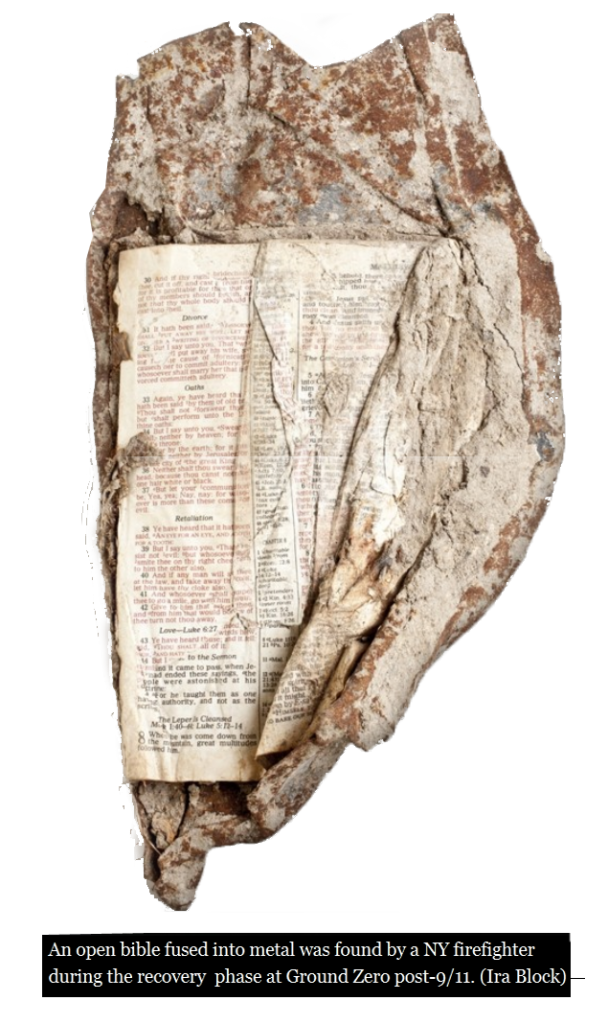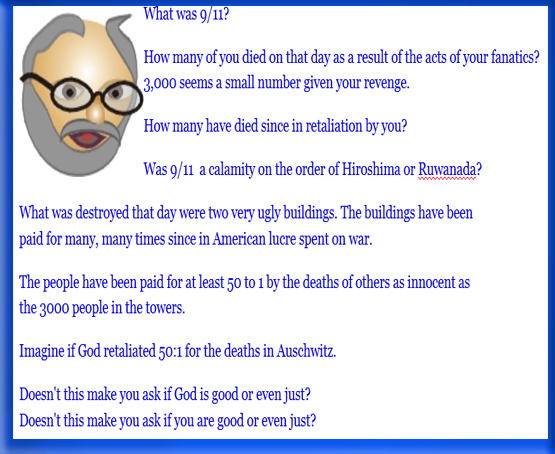 What have we learned about religion post-9/11?
What have we learned about religion post-9/11?
(excerpted)
On Faith reached out to some of the world’s most influential religious leaders and thinkers to ask about faith in a post-attack world.
Below are excerpts from our expert roundtable. Click through to read the individual essays.
From the Dalai Lama’s statement for On Faith, “We need to learn from our painful memories of September 11th and become more aware of the destructive consequences that arise when we give in to feelings of hatred.”
“There are three lessons to be learned from 9/11,” writes Rick Warren. “First, life is a gift that is fragile and brief. Whatever you are going to do with your life, you had better get it done. Second, everybody needs community. And thirdly, everybody has a spiritual hole in their heart that only God can fill.”
“It seems that much of the post-9/11 renewal of faith has waned in the years that have followed,” writes Thomas Monson, president of the Church of Jesus Christ of Latter-day Saints. “It should not require tragedy for us to remember God.”
“It remains a fact that some of the most terrifying instances of human conflict and stupidity would be unthinkable without religion,” writes Sam Harris.
From Archbishop Desmond Tutu: “If it were possible for anything to be more devastating than the unnecessary deaths that have accrued over the past 10 years, I would argue that the damage that has been done to global relations between the so-called Judeo-Christian and Muslim worlds must be a candidate.”
Imam Feisal Abdul Rauf, who spent much of the last year under sharp critique for his plans to build an Islamic center near Ground Zero, writes, “Americans should come away from the last decade understanding that radical Islam is a small and increasingly spent force.”
“9/11 reminds us that life is fragile and that ultimately we’ll all die,” writes Marc Driscoll, pastor of Mars Hill Church, offering the “hope-filled  vision of the Bible” as the antidote to violence of the attacks.
vision of the Bible” as the antidote to violence of the attacks.
The Rev. Katharine Jefferts Schori says, “The greatest memorial to those who died ten years ago will be a world more inclined toward peace.”
Cardinal Donald Wuerl says, “Jesus offers us an answer not only to this great act of violence — now known simply as 9/11 — but also to the very root and source of all such manifestations of hatred.”
Ambassador Suzan Johnson Cook writes about taking “the spirit of 9/11” from her experience as a NYPD chaplain to her current work at the State Department: “Countries that respect the faith of their citizens will be the stronger for it and can be a part of the pursuit for peace and understanding among those of all faiths. This is the message that I carry in the spirit of 9/11.”
T.D. Jakes writes that the lessons of 9/11 are hidden in plain sight. Among them: “We’ve neglected to comprehend that there is more that unites than separates us.”
Yasir Qadhi gives five facts–and five misconceptions–Americans believe today about Islam, including the myth that “Muslims are out to overthrow the Constitution and establish Sharia in America.” Rabbi David Wolpe writes, “Faith can be turned to evil when people believe that God’s word is made as small as a resentful heart. Faith can be as large as the sky and healing as a lover’s touch when we understand that God wishes goodness.”
“Two of the victims who died in the airplanes that crashed into the twin towers were coming to see me,” writes Deepak Chopra. “Looking back, I feel now the way I did back then, 10 years ago. Catastrophes are not a form of divine punishment, a test from God, evidence of sin, or secret messages from beyond. They are part of our divided world, and such a world reflects our divided self.”
“I don’t think the 9/11 attacks taught us anything we didn’t already know about religion. It has long been obvious-even to the deeply religious-that religious fanaticism is an extremely dangerous deranger of otherwise sane and goodhearted people,” writes Daniel Dennett.
Religion scholar Karen Armstrong says it’s time for religion to be a force for good. “Ten years on, the world is even more dangerously polarized and religion, for obvious reasons, religion is seen not as part of the solution but as part of the problem.”
Lama Surya Das calls 9/11 a Zen teaching moment. “We realized how interconnected and interdependent we all are, both at home and abroad. This is how heartbreak can evolve into openheartedness, how we can gain through loss.”
By Elizabeth Tenety | 12:25 PM ET, 09/08/2011